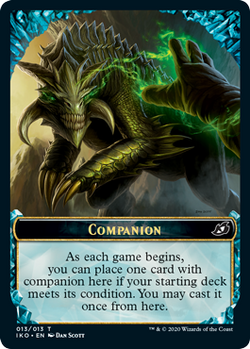| Companion | |
|---|---|
| Keyword Ability | |
| Type | Static |
| Introduced | Ikoria: Lair of Behemoths |
| Last used | Ikoria: Lair of Behemoths |
| Reminder Text |
Companion — [deck-building restriction] (If this card is your chosen companion, you may pay |
| Statistics |
10 cards |
| Scryfall Search | |
| keyword:"Companion —" | |
- For the app, see Magic: The Gathering Companion.
Companion is a keyword ability is featured in Ikoria: Lair of Behemoths.[1][2] Companion is also the name for legendary creatures with that keyword ability. There are ten companions in the set.
Description

Companion marker
The companion ability lists a deckbuilding rule. If your starting deck follows that rule, then the creature can serve as your chosen companion.
You may have up to one chosen companion for each game. That chosen companion doesn't start in your main deck; rather, it starts in your sideboard. (If you're playing casually without sideboards, it's just in your collection outside the game. All the same rules apply to it.) This means it doesn't count toward meeting the minimum deck size in the format you're playing, but in Constructed formats, it does count toward your sideboard size. Just before the game begins, reveal your chosen companion to all players.
Original rules
The original rules stated that once during the game, you were allowed to cast your chosen companion from your sideboard. Doing so followed all the normal rules for casting a creature spell, so you could normally do so only during your main phase. Casting your chosen companion brought it into the game for good, after which it could be destroyed, exiled, returned to your hand, shuffled into your library, etc. and wouldn't return to the sideboard until the game ended.
Current rules
The rules for Companion were updated on June 1, 2020. With the new rules, once per game, a player can take a special action and pay to put their Companion from outside the game into their hand. This can only be done any time that player can cast a sorcery. This special action does not use the stack and cannot be responded to. Once a Companion is brought into the game in this manner, it remains in the game until the game ends.
Rules
From the glossary of the Comprehensive Rules (April 12, 2024—Outlaws of Thunder Junction)
- Companion
- A keyword ability that allows a player to choose one creature card from outside the game as a companion if the restriction of that card’s companion ability is met. Once a player has chosen a companion, that player may pay {3} to put it into their hand once during the game. See rule 702.139, “Companion.”
From the Comprehensive Rules (April 12, 2024—Outlaws of Thunder Junction)
- 702.139. Companion
- 702.139a Companion is a keyword ability that functions outside the game. It’s written as “Companion—[Condition].” Before the game begins, you may reveal one card you own from outside the game with a companion ability whose condition is fulfilled by your starting deck. (See rule 103.2b.) Once during the game, any time you have priority and the stack is empty, but only during a main phase of your turn, you may pay {3} and put that card into your hand. This is a special action that doesn’t use the stack (see rule 116.2g). This is a change from previous rules.
- 702.139b If a companion ability refers to your starting deck, it refers to your deck after you’ve set aside any sideboard cards. In a Commander game, this is also before you’ve set aside your commander.
- 702.139c Once you take the special action and put the card with companion into your hand, it remains in the game until the game ends.
From the Comprehensive Rules (April 12, 2024—Outlaws of Thunder Junction)
- 103.1b In an Archenemy game, these methods aren’t used to determine who takes the first turn. Rather, the archenemy takes the first turn.
From the Comprehensive Rules (April 12, 2024—Outlaws of Thunder Junction)
- 116.2g A player who has chosen a companion may pay {3} to put that card from outside the game into their hand. This is a special action. A player can take this action any time they have priority and the stack is empty during a main phase of their turn, but only if they haven’t done so yet this game. (See rule 702.139, “Companion.”)
Rulings
- Your companion begins the game outside the game. In tournament play, this means your sideboard. In casual play, it's simply a card you own that's not in your starting deck.[3]
- Before shuffling your deck to become your library, you may reveal one card from outside the game to be your companion if your starting deck meets the requirements of the companion ability. You can't reveal more than one. It remains revealed outside the game as the game begins.
- The requirements of the companion ability apply only to your starting deck. They do not apply to your sideboard.
- If more than one player wishes to reveal a companion, the starting player does so first, and players proceed in turn order. Once a player has chosen not to reveal a companion, that player can't change their mind.
- The companion's other abilities apply only if the creature is on the battlefield. They have no effect while the companion is outside the game.
- The companion ability has no effect if the card is in your starting deck. You may put a card with a companion ability into your starting deck regardless of whether or not your deck meets the requirements. For example, Zirda may be in your starting deck even if your other permanent cards don't all have activated abilities.
- You may have one companion in the Commander variant. Your deck, including your commander, must meet its companion requirement. Your companion is not one of your 100 cards.
Examples
Example
Keruga, the Macrosage
Legendary Creature — Dinosaur Hippo
5/4
Companion — Your starting deck contains only cards with converted mana cost 3 or greater and land cards. (If this card is your chosen companion, you may cast it once from outside the game.)
When Keruga, the Macrosage enters the battlefield, draw a card for each other permanent you control with converted mana cost 3 or greater.
Controversy
Companions were quickly deemed too powerful, leading to repetitive games and upsetting the eternal formats.[4] All ten of them were reasonably sized, some with further engine capacity, both of which magnified the inherent card advantage of casting accessibility. People questioned the capability of R&D, and especially Play Design, which lead to Mark Rosewater questioning if balance should outweigh pushing into unexplored space.[5] The deckbuilding restrictions were considered to be generally a minor consequence for multiple formats, including the most prominent one of Lutri, the Spellchaser being literally inconsequential for Commander (the restriction was for a Singleton deck, which Commander has by definition) and so necessitated a ban on release day.
The most egregious was Lurrus of the Dream Den, whose restriction was "no permanents above 2 CMC". For most decks in Modern, Legacy and Vintage, this already would be a minor sacrifice, as three-mana permanents were already considered expensive haymakers. Its passive ability to recast these permanents made it a superior value engine for effectively all decks that have any permanents at all. With this said, it took less than two weeks for the Eternal formats to have top-standing decks dominated by Lurrus decks. Due to how the Companion mechanics worked, Lurrus obtained the infamy of being the first power level card banned in Vintage since the restriction paradigm, as restriction would not change anything - only one copy was ever played, as ironically it defies its own restriction.
After banning Lurrus in Vintage and Legacy and Zirda, the Dawnwaker in Legacy, Wizards of the Coast announced that if Companions would cause long-term health issues in other formats, they would be willing to take steps up to, or including, changing how the companion mechanic works.[6] As Companion is having ripples throughout almost all of the constructed formats in a way no singular mechanic ever has, it might call for special action.[7]
A month after Ikoria: Lair of Behemoths' release, the keyword received a rules change. The original ability allowed companions to be cast from the sideboard once per game (upon meeting certain conditions in deckbuilding)[7]. With the rules update, companions may be added to the owner's hand from the sideboard upon paying , instead of being castable from the sideboard.[8]
References
- ↑ Matt Tabak (April 2, 2020). "Ikoria: Lair of Behemoths Mechanics". magicthegathering.com. Wizards of the Coast.
- ↑ Mark Rosewater (April 13, 2020). "A Twinkle in Someone's Ikoria". magicthegathering.com. Wizards of the Coast.
- ↑ Eli Shiffrin (April 10, 2020). "Ikoria: Lair of Behemoths and Commander (2020 Edition) Release Notes". magicthegathering.com. Wizards of the Coast.
- ↑ Sam Black (April 8, 2020). "Companion Is The Worst Mechanic For The Health Of Magic Since Phyrexian Mana". Starcitygames.com.
- ↑ I put companion into Ikoria. Was I wrong to do so?. Reddit (May 7, 2020).
- ↑ Ian Duke (May 18, 2020). "May 18, 2020 Banned and Restricted Announcement". magicthegathering.com. Wizards of the Coast.
- ↑ a b Mark Rosewater (May 18, 2020). "I saw this in the latest b&r announcement". Blogatog. Tumblr.
- ↑ Ian Duke (June 1, 2020). "June 1, 2020 Banned and Restricted Announcement". magicthegathering.com. Wizards of the Coast.
Template:Keywords and abilities
